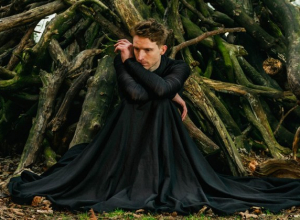Controversy Grows Over Spielberg's Tintin
By Lew Irwin on 19 October 2011
It doesn't open in Europe until October 26, and it won't be seen in the U.S. until December, but Steven Spielberg's The Adventures of Tintin The Secret of the Unicorn is already drawing much criticism from fans of the original Hergé comic strip and those who have accused the Belgian writer/artist of racism, antisemitism, and sexism. Typical of the fury ignited by the movie, Nicholas Lezard, the literary critic for Britain's Guardian newspaper, said that when he left the theater showing the Tintin film, he founding himself "too stunned and sickened to speak; for I had been obliged to watch two hours of literally senseless violence being perpetrated on something I loved dearly. In fact, the sense of violation was so strong that it felt as though I had witnessed a rape." If other fans of Hergé react the same way, it could diminish the value of Tintin books and merchandise, which have remained top retail sellers overseas, other critics of the movie suggest. "There's a risk that Spielberg's vision will undermine Hergé's," Jean-Claude Jouret, a former manager of Hergé's estate told Agence France-Presse, the French news agency. Making the movie, he said, was "undoubtedly good business but perhaps it won't help the longterm preservation of his work." Meanwhile, critics of Hergé are wondering why Spielberg would ever have wanted to associate himself with the man. They note that a court case is currently winding up in Brussels in which a Congolese citizen is demanding that Tintin in Congo be banned because it amounts to "a justification of colonialization and white supremacy." They note further that Hergé was arrested after World War II for collaborating with the Nazis and inserting anti-Semitic subplots in Tintin stories. And Matthew Parris, a columnist for the London Times, noted that there is virtually a complete absence of women from Hergé's stories, a condition also apparent in Spielberg's movie.
19/10/2011
Contactmusic
Suggested

Leisure Festival - Dreamland in Margate
On the same day that Glastonbury welcomed back Margate's adopted sons, The Libertines, Margate itself put on it's very own Leisure Festival as it...

Pretty Fierce talk to us about collaborating with Doja Cat, emetophobia, arena tours and staying "true to yourself" [EXCLUSIVE]
Sheffield's very own all girl group Pretty Fierce are still on a high after the recent release of their debut single - 'Ready For Me'.

Will Varley & Jack Valero - The Astor Theatre Deal Live Review
Three nights before the end of his current tour Will Varley returned to his home town of Deal to delight a sold out crowd in The Astor Theatre.

WYSE talks to us about her "form of synaesthesia", collaborating with Radiohead's Thom York and the prospect of touring with a band [EXCLUSIVE]
With only a few days to go before Portsmouth based songstress and producer WYSE releases her new single, 'Belladonna', we caught up with her to find...
Advertisement

Bay Bryan talks to us about being a "wee queer ginger", singing with Laura Marling and being inspired by Matilda [EXCLUSIVE]
Colorado raised, Glasgow educated and Manchester based Bay Bryan is nothing if not a multi-talented, multi-faceted artist performing as both...

Keelan X talks to us about staying true to "your creative vision", collaborating with Giorgio Moroder and being "a yoga nut" [EXCLUSIVE]
Former Marigolds band member Keelan Cunningham has rediscovered his love of music with his new solo project Keelan X.
![Luke De-Sciscio talks to us about having the courage to be yourself, forgiving that which is outside of one's control and following whims [EXCLUSIVE] Luke De-Sciscio talks to us about having the courage to be yourself, forgiving that which is outside of one's control and following whims [EXCLUSIVE]](https://images.contactmusic.com/images/home/homepage/luke-de-sciscio-abof-a.jpg)
Luke De-Sciscio talks to us about having the courage to be yourself, forgiving that which is outside of one's control and following whims [EXCLUSIVE]
Wiltshire singer-songwriter Luke De Sciscio, formally known as Folk Boy, is set to release is latest album - 'The Banquet' via AntiFragile Music on...

Annie Elise talks to us about the challenges a female producer has to face and "going through a year of grief and sickness" [EXCLUSIVE]
Electronic music pioneer and producer Annie Elise says that the release of her first EP - 'Breathe In, Breathe Out' feels "both vulnerable and...
Advertisement

